Related Research Articles
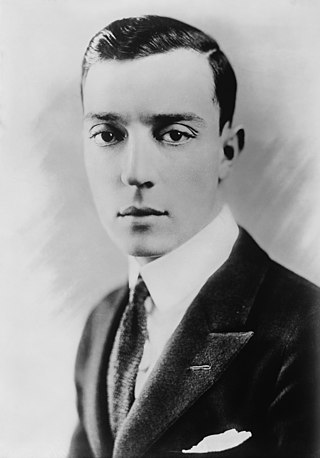
Joseph Frank "Buster" Keaton was an American actor, comedian and filmmaker. He is best known for his silent films during the 1920s, in which he performed physical comedy and inventive stunts. He frequently maintained a stoic, deadpan facial expression that became his trademark and earned him the nickname "The Great Stone Face".
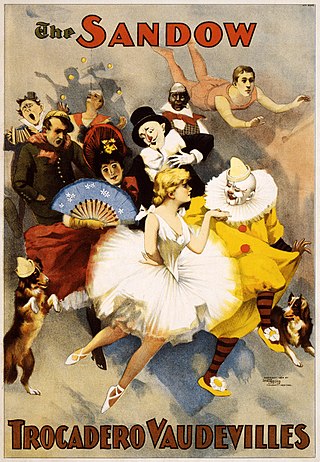
Vaudeville is a theatrical genre of variety entertainment which began in France at the end of the 19th century. A Vaudeville was originally a comedy without psychological or moral intentions, based on a comical situation: a dramatic composition or light poetry, interspersed with songs and dances. It became popular in the United States and Canada from the early 1880s until the early 1930s, while changing over time.

Muskegon County is a county in the U.S. state of Michigan. As of 2020, the population was 175,824. The county seat is Muskegon.

Muskegon is a city in and the county seat of Muskegon County, Michigan, United States. Situated around a harbor of Lake Michigan, Muskegon is known for fishing, sailing regattas, and boating. It is the most populous city along Lake Michigan's eastern shore. At the 2020 census, the city's population was 38,318. The city is administratively autonomous from adjacent Muskegon Township, and several locations in Muskegon Township and other surrounding townships have Muskegon addresses.
Deadpan, dry humour, or dry-wit humour is the deliberate display of emotional neutrality or no emotion, commonly as a form of comedic delivery to contrast with the ridiculousness or absurdity of the subject matter. The delivery is meant to be blunt, ironic, laconic, or apparently unintentional.

West Michigan and Western Michigan are terms for a region in the U.S. state of Michigan's Lower Peninsula. Generally, it refers to the Grand Rapids-Muskegon-Holland area, and more broadly to most of the region along the Lower Peninsula's Lake Michigan shoreline, but there is no official definition.
Bluffton may refer to:
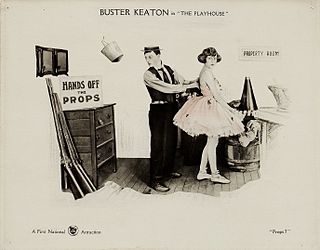
The Playhouse is a 1921 American two-reel silent comic trick film written by, directed by, and starring Buster Keaton. It runs for 22 minutes, and is most famous for an opening sequence where Keaton plays every role.

Educational Pictures, also known as Educational Film Exchanges, Inc. or Educational Films Corporation of America, was an American film production and film distribution company founded in 1916 by Earle Hammons (1882–1962). Educational primarily distributed short subjects; it is best known for its series of comedies starring Buster Keaton and the earliest screen appearances of Shirley Temple (1932–34). The company ceased production in 1938, and finally closed in 1940 when its film library was sold at auction.

Alice Lake was an American film actress. She began her career during the silent film era and often appeared in comedy shorts opposite Roscoe "Fatty" Arbuckle.
Keaton is an Old English surname derived from a place name meaning "place of hawks"; less commonly used as a given name.

Joseph Henry Roberts was an American comic actor who appeared in 16 of Buster Keaton's 19 silent short films of the 1920s.
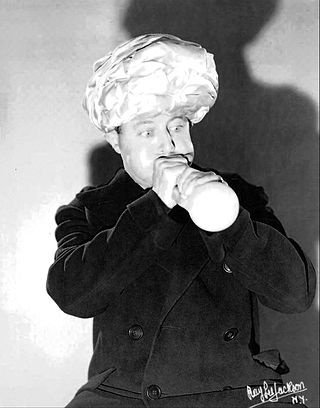
Joe Cook was an American vaudeville performer. He was a household name in the 1920s and 1930s as one of America's most popular entertainers, and he headlined at New York's famed Palace Theatre. After appearing on Broadway, he broke into radio performance.

Joseph Hallie Keaton was an American vaudeville performer, eccentric dancer and silent film actor. He was the father of actor Buster Keaton and appeared with his son in several films.

Myra Edith Keaton was an American vaudeville performer and film actress. She was the mother of actor Buster Keaton.

Ramona Park was an amusement park located in the city of East Grand Rapids, Michigan between 1897 and 1955. The Park included a double track wooden roller coaster, a theater pavilion, a ridable miniature railway and boat livery.

The Boat is a 1921 American two-reel silent comedy film written and directed by, and starring Buster Keaton. Contemporary reviews consider it one of his best shorts, with One Week (1920), The Playhouse (1921) and Cops (1922). It is presently in the public domain. The International Buster Keaton Society takes its name, The Damfinos, from the name of the film's boat.
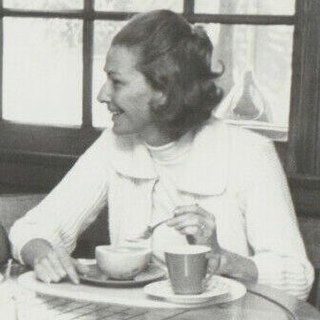
Eleanor Ruth Keaton was an American dancer and variety show performer. She was an MGM contract dancer in her teens and became the third wife of silent-film comedian Buster Keaton at the age of 21. She is credited with rehabilitating her husband's life and career. The two performed at the Cirque Medrano in Paris and on European tours in the 1950s; she also performed with him on The Buster Keaton Show in the early 1950s. After his death in 1966, she helped ensure Keaton's legacy by giving many interviews to biographers, film historians, and journalists, sharing details from his personal life and career, and also attended film festivals and celebrations honoring Keaton. In her later years, she bred champion St. Bernard dogs, was a gag consultant for Hollywood filmmakers, and was an invited speaker at silent-film screenings.
The International Buster Keaton Society Inc.— a.k.a. "The Damfinos"—is the official educational organization dedicated to comedy film producer-director-writer-actor-stuntman Buster Keaton.

Louis Anger was an American vaudeville performer and movie studio executive. During the early days of the American silent film industry, Anger was considered to be "the king of slapstick comedy producers," and was instrumental in developing the film careers of famed actors Fatty Arbuckle and Buster Keaton.
References
- 1 2 Gustafson, Anna (October 1, 2019). "'Being in Muskegon is very special': 25th annual Buster Keaton Convention celebrates one of the world's most influential filmmakers Oct. 4–6". Muskegon Times. Retrieved January 26, 2021.
- ↑ McGrath, Sheila (October 4, 2019). "Silent films showing at Frauenthal as part of 25th annual Buster Keaton convention". Mlive. Retrieved February 2, 2021.
- 1 2 "Bluffton Actors' Colony / Buster Keaton". michmarker.com. Archived from the original on November 27, 2020. Retrieved February 2, 2021.
{{cite web}}: CS1 maint: unfit URL (link) - ↑ "BUSTER KEATON'S MUSKEGON CONNECTION". Great Lakes Gazette. October 4, 2016. Retrieved February 2, 2021.
- ↑ "Landmark of "Joe" Keaton's Day Passes from Actors' Colony". Detroit Free Press. July 8, 1928.
- ↑ Bower, Helen (January 11, 1961). "Old Summers at Muskegon". Detroit Free Press.
- ↑ "The Theater". Detroit Free Press. August 1, 1919.